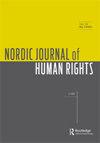Litigating Climate Change before the Committee on the Rights of the Child in Sacchi v Argentina et al.: Breaking New Ground?
IF 1.2
Q3 POLITICAL SCIENCE
引用次数: 1
Abstract
ABSTRACT In September 2019, 16 children petitioned against Argentina, Brazil, France, Germany and Turkey before the United Nations Committee on the Rights of the Child (UNCRC) in what has come to be known as the Sacchi case. The children requested that the UNCRC find that those States had caused and perpetuated climate change by knowingly disregarding scientific evidence, and that, in so doing, they had violated the children's human rights. In October 2021, the UNCRC dismissed the petition upon the grounds that it was inadmissible, as the petitioners had failed to exhaust domestic remedies. The Sacchi case gave rise to new challenges with regards to the admissibility of the decision: beyond the exhaustion of domestic remedies, the UNCRC had to grapple with the issue of victimhood in the context of climate change and extraterritorial climate obligations conferred to States in the Convention on the Rights of the Child. The Office of the High Commissioner for Human Rights declared the Sacchi decision a 'historic ruling'. But did the UNCRC's conclusions in Sacchi truly break new ground? This article explores that question by examining the three admissibility criteria in turn: extraterritorial jurisdiction, victimhood, and the exhaustion of domestic remedies.在萨基诉阿根廷等人案中向儿童权利委员会提起气候变化诉讼:开创新局面?
2019年9月,16名儿童向联合国儿童权利委员会(UNCRC)起诉阿根廷、巴西、法国、德国和土耳其,该案被称为“萨基案”。儿童们要求儿童权利委员会认定,这些国家故意无视科学证据,造成并延续了气候变化,因此侵犯了儿童的人权。2021年10月,联合国儿童权利委员会驳回了请愿书,理由是请愿书不可受理,因为请愿人未能用尽国内补救办法。萨基案对该决定的可接受性提出了新的挑战:除了用尽国内补救办法之外,《儿童权利公约》还必须在气候变化和《儿童权利公约》赋予各国的治外法权气候义务的背景下处理受害者问题。联合国人权事务高级专员办公室宣布对萨基的裁决是“历史性的裁决”。但联合国儿童权利委员会在萨基案中得出的结论真的有了新的突破吗?本文通过依次审查三个可受理性标准来探讨这一问题:治外法权、受害者身份和用尽国内补救办法。
本文章由计算机程序翻译,如有差异,请以英文原文为准。
求助全文
约1分钟内获得全文
求助全文
来源期刊

Nordic Journal of Human Rights
POLITICAL SCIENCE-
CiteScore
1.00
自引率
25.00%
发文量
29
期刊介绍:
The Nordic Journal of Human Rights is the Nordic countries’ leading forum for analyses, debate and information about human rights. The Journal’s aim is to provide a cutting-edge forum for international academic critique and analysis in the field of human rights. The Journal takes a broad view of human rights, and wishes to publish high quality and cross-disciplinary analyses and comments on the past, current and future status of human rights for profound collective reflection. It was first issued in 1982 and is published by the Norwegian Centre for Human Rights at the University of Oslo in collaboration with Nordic research centres for human rights.
 求助内容:
求助内容: 应助结果提醒方式:
应助结果提醒方式:


